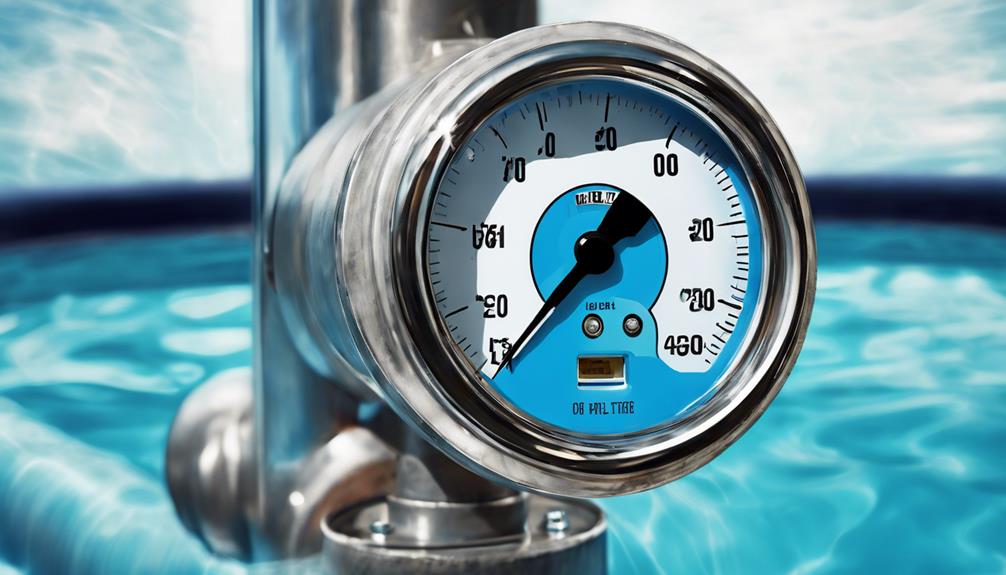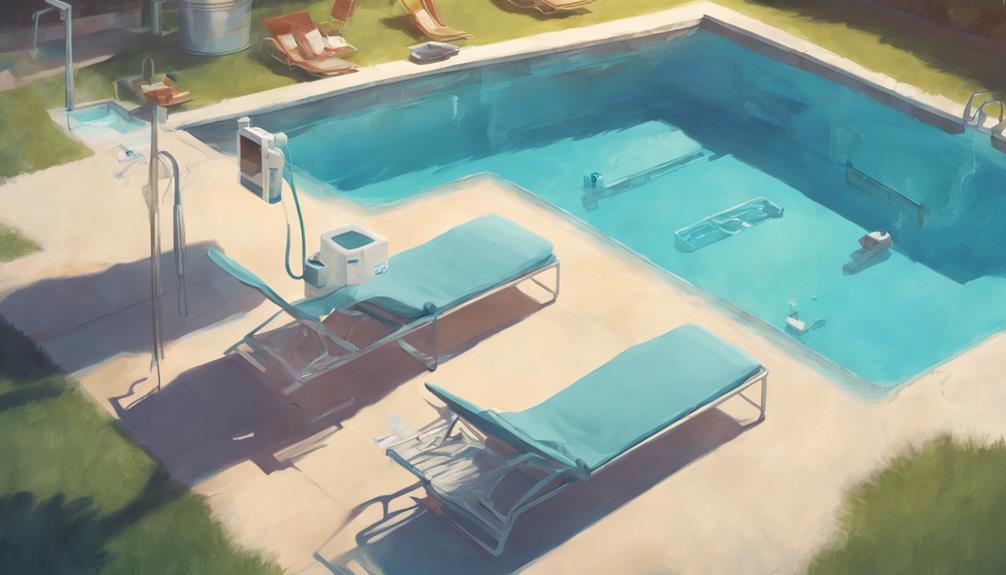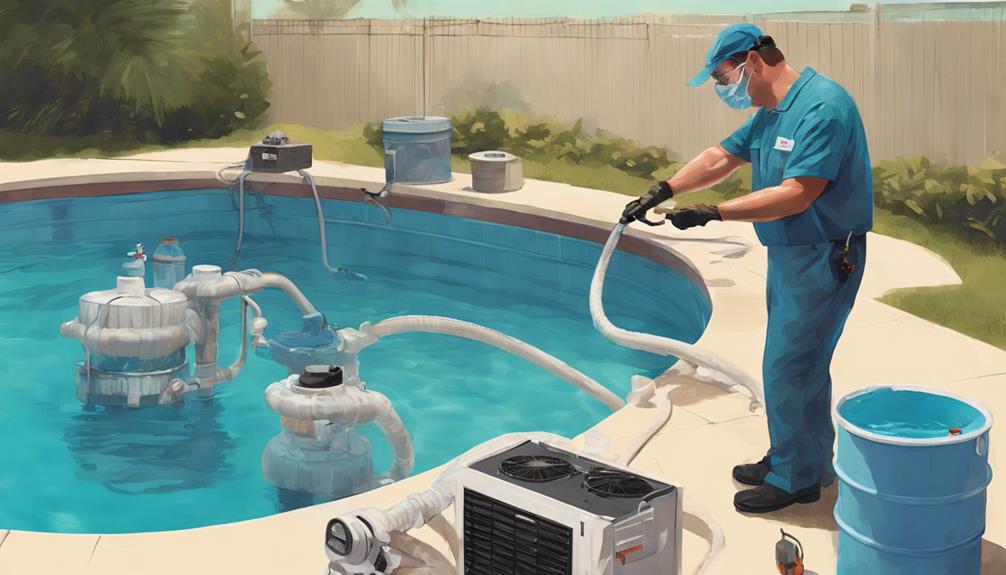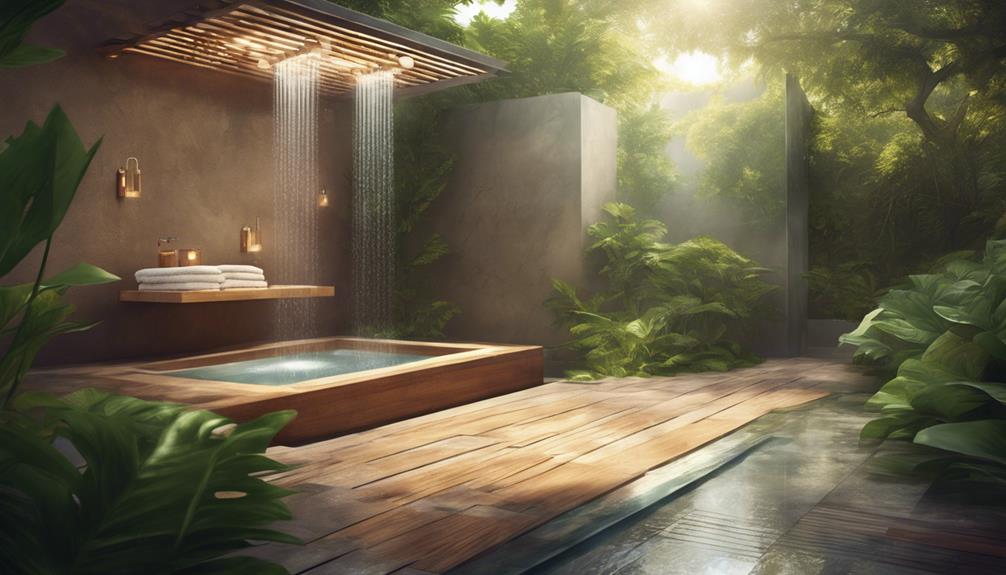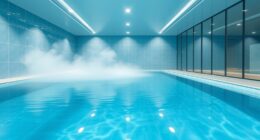High pool pressure may be a result of water flow problems, such as blockages or dirty filters. It is important to ensure that the pressure gauge is registering between 0 to 60 PSI. A 10 PSI increase could indicate a problem. Regularly cleaning the filter is crucial in preventing high pressure. Failure to maintain the filter can result in costly consequences. If persistent high pressure is detected, it is advisable to investigate for blockages or consider replacing the filter. Seeking professional maintenance services can provide expert advice. Having a good understanding of the causes and solutions for high pool pressure is vital for an efficient filtration system.
Key Takeaways
- High pressure indicates potential blockages or filter issues.
- Regular filter cleaning can prevent high pressure in pools.
- Consult professionals for expert diagnosis and solutions.
- Consider filter replacement for persistent high pressure.
- Proper maintenance prevents costly damages and ensures optimal performance.
Pressure Gauge Reading & Interpretation
Understanding how to interpret the pressure gauge reading is necessary for maintaining proper pool filtration system functionality. The pressure gauge on the pool filter should usually read between 0 to 60 PSI.
Monitoring the gauge regularly is vital, as a pressure increase of 10 PSI from the baseline indicates potential issues. High PSI levels suggest water flow problems, which can result in cloudy pool water, while low PSI signifies inadequate water reaching the filter.
Cleaning & Maintenance Procedures
Proper maintenance and cleaning procedures play an important role in ensuring the best functionality of a pool filtration system. Regular upkeep is essential for the best performance and longevity of the pool equipment.
Here are some key cleaning and maintenance procedures to follow:
- Regular Cleaning: Perform weekly filter cleaning to maintain clear pool water.
- Monitor Pressure: Keep track of the filter gauge readings to detect any abnormalities.
- Address Issues Promptly: Fix high pressure by cleaning the filter promptly.
- Preventive Maintenance: Neglecting maintenance can lead to costly damage; prioritize regular checks.
- Professional Assistance: Seek expert pool maintenance services for thorough cleaning and support.
Filter Replacement Considerations

Regular evaluation and timely replacement of pool filters are necessary for maintaining ideal water flow and pressure levels in the filtration system. When high pressure persists even after thorough cleaning, it may be a sign that the filter needs replacement.
Outdated filters can lead to increased pressure readings, impacting water clarity and system efficiency. Before replacing the filter, make sure to research and select a suitable replacement to enhance functionality. If the issue persists post-replacement, consider replacing the gauge as well.
Proper filter replacement is vital in normalizing pressure levels and ensuring peak performance of the pool filtration system. By addressing filter replacement considerations promptly, pool owners can maintain a well-functioning and clear pool environment.
Dealing With Persistent High Pressure
When faced with persistent high pressure in your pool filtration system, it is crucial to take immediate action to address the underlying issues effectively.
To deal with this situation:
- Monitor Pressure Gauge: Check the gauge regularly for any significant increase.
- Inspect and Clean Filters: Verify filters are clean and free from debris.
- Check for Water Flow Issues: Investigate potential blockages or obstructions.
- Consider Filter Replacement: If cleaning doesn't resolve the issue, replacing the filter might be necessary.
- Seek Professional Help: If problems persist, consult a professional for expert advice and assistance.
Taking these steps promptly can help normalize the pressure in your pool and ensure peak filtration system functionality.
Importance of Professional Maintenance
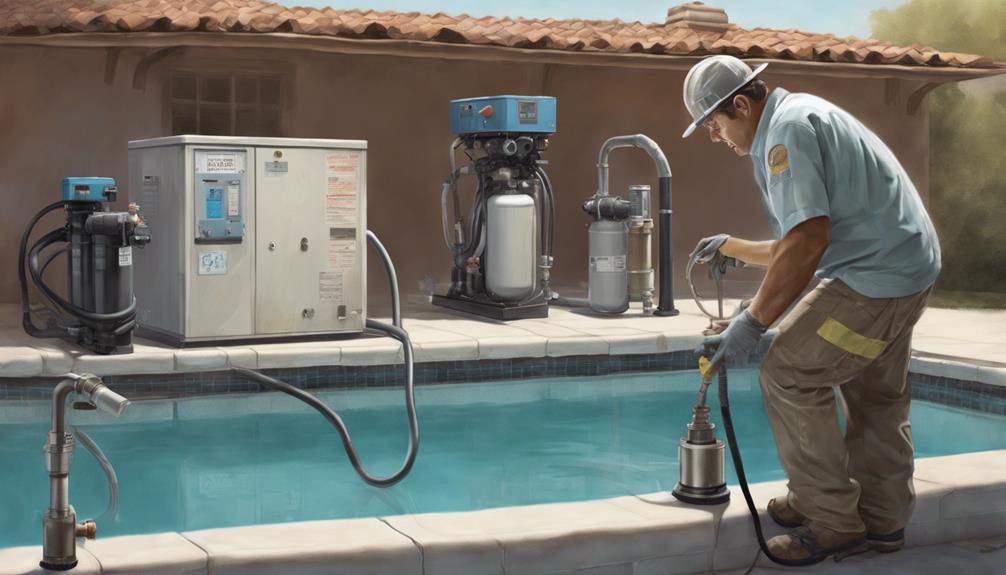
Professional maintenance services are necessary for ensuring the longevity and peak performance of your pool filtration system. While regular cleaning and upkeep are vital for optimal functioning, professional maintenance offers a higher level of expertise and thoroughness. Certified professionals have the knowledge and experience to detect underlying issues that may not be apparent to the untrained eye.
They can provide thorough inspections, identify potential problems early on, and implement effective solutions to prevent costly damages. Additionally, professional maintenance services often include specialized equipment and techniques that guarantee your pool filtration system operates at its best. By investing in professional maintenance, you can enjoy a well-maintained pool with proper filtration, clear water, and extended equipment lifespan.
Frequently Asked Questions
How Often Should I Backwash My Pool Filter?
Regularly backwash your pool filter based on manufacturer recommendations or when the pressure gauge on the filter reaches 8-10 PSI above the clean reading. This guarantees efficient filtration and water clarity, preventing pressure-related issues in your pool system.
Can Using a Pool Cover Affect Filter Pressure?
Using a pool cover can affect filter pressure by reducing debris infiltration, potentially leading to lower pressure. However, it may also trap contaminants, causing higher pressure. Regular monitoring and maintenance are essential for best filtration efficiency.
Is There a Specific Time of Day to Check Filter Pressure?
It is advisable to check filter pressure during periods of regular pool use, ensuring accurate readings. Early morning or late afternoon may be ideal as water flow rates vary throughout the day. Regular checks optimize filter performance.
Can Adding Too Many Chemicals Cause High Pressure?
Surprisingly, adding excess chemicals can elevate pool pressure. Overdosing chemicals can disrupt water balance, causing clogs and increased pressure. Maintain chemical levels within the recommended range to avoid unnecessary strain on the filtration system.
Should I Run My Pool Pump Longer to Reduce Pressure?
To decrease high pool pressure, consider adjusting the pump's runtime. Running the pump longer can increase water flow, aiding in pressure reduction. Monitor pressure levels closely to ensure ideal filtration and clear pool water.
How Can High Pool Pressure Affect the Value and Appeal of My Home?
High pool pressure can be a sign of underlying issues that impact your home’s appeal. Potential buyers may see it as a red flag, affecting the value of your property. Investing in pool remodels for home value can help address these issues and improve the overall appeal of your home.
Conclusion
To sum up, maintaining peak pool pressure is essential for water clarity and system efficiency. By consistently checking pressure readings, conducting regular cleaning, and maintenance, and planning for timely filter replacements, pool owners can effectively tackle high-pressure issues.
Keep in mind, prevention is better than cure – keeping up with pool maintenance can save time, money, and guarantee a sparkling oasis for everyone to appreciate.

